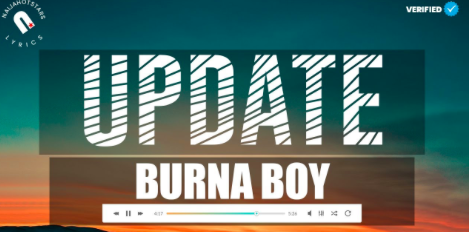Burna Boy’s “Update” is more than just another club-ready anthem from the Nigerian global superstar—it’s a cultural collision, a rhythmic flex, and a spiritual assertion wrapped in audacity and Afro-fusion brilliance. Melding his unmistakable tone with interpolations of Soul II Soul’s classic “Back to Life,” Burna creates a track that is both nostalgic and forward-driving. It’s Burna doing what he does best: elevating the ordinary into the extraordinary, using global references while staying deeply rooted in African storytelling.
Intro: Nostalgia Meets the New School
The track opens with the iconic refrain from Soul II Soul’s 1989 hit:
“Back to life, back to reality / Back to the here and now, oh yeah”
This isn’t just an homage—it’s a framing device. By sampling a universally recognizable line that once defined late ’80s/early ’90s Black British soul, Burna sets a temporal tone, grounding the listener in a shared memory before launching us into his very Nigerian reality. It’s as if he’s reminding the listener that no matter how much has changed, some themes—resilience, identity, and grind—stay constant. The blend of old and new also plays directly into Burna’s role as a cultural bridge between Africa and the diaspora.
And then the rhythm drops:
“Biggie bumbum, biggie bumbum…”
Repetitive, catchy, and suggestive—it’s a rhythm chant that turns hips, turns heads, and stirs dance floors. It’s African club culture in its most distilled form: percussive, hypnotic, and unapologetically visceral.
Burna’s first verse opens with a line packed with energy and warning:
“On a normal day, them no fit touch my energy”
This isn’t just boastful—it’s protective. It’s a boundary. In a world that constantly tests the mental, emotional, and spiritual stamina of Black men, Burna affirms control over his vibe and space. He follows it with:
“If I no get money, na disability”
A line that cuts sharply into Nigerian socio-economic reality. In a society where wealth often determines respect, safety, and power, Burna critiques the brutal truth without flinching. He doesn’t say it proudly—he says it plainly. That honesty is part of what makes his lyrics resonate.
Another sharp line emerges:
“Baba o, suffocate, mo ma ṣa e blocking”
Here, Burna slips into Yoruba, maintaining local authenticity. He alludes to blocking negativity or those who may attempt to dim his light. This isn’t just braggadocio—it’s survival. The blend of Pidgin and Yoruba is seamless, not ornamental. Burna uses language as armor and rhythm as his shield.
Chorus: Interpolation, Irony, and Wit
The hook—co-delivered with Soul II Soul’s sample—builds on contrast:
“Má lọ sa o (However do you want me)
Be’ri fun oga o (However do you need me)
Agbabiaka o (However do you want me)
Gbá update k’ole pa’wo (However do you need me)”
It’s catchy, no doubt—but also layered. “Gbá update k’ole pa’wo” roughly translates to “collect the update so you won’t lose money.” In Nigerian slang, “update” often refers to insider knowledge, a hustle tip, or a new opportunity. Burna flips the hook into street-smart wisdom wrapped in Afrobeat groove. While Soul II Soul’s original was about emotional connection, Burna shifts it to economic survival and power plays, yet somehow maintains a strange synergy between the two.
The ironic twist comes when he sings:
“Ọmọ Ọba Jesu, iwo ọkọ ashawo”
Meaning, “Child of the King (Jesus), husband of a prostitute.” It’s simultaneously provocative, satirical, and humorous—a spiritual jab mixed with street corner commentary. This line captures Burna’s love for contradiction and tension. He invites the sacred and profane into the same room, laughing in their faces while dancing between them.
Wealth, Women, and Wounds
In the second verse, Burna leans deeper into his personal ethos:
“Na my fruit of labour ni / Everyday, I dey spray money”
This is the fruit of hustle, he tells us. Every dollar “sprayed” (a West African party tradition where money is thrown on dancers or celebrants) is earned through pain, through effort. But it’s not just about him—there’s always a subtle commentary on relationships:
“Every woman give me special treatment / Wọn fi mi’le ni gba kan, kan, kan, kan”
Translation: “They once left me behind.” These lines reveal the classic Burna contradiction again—he’s worshipped now, but he remembers when he was overlooked. There’s pain behind the praise, always a reminder that success hasn’t erased his past.
Even when he plays up romantic conquests or flexes his lifestyle, there’s a sense that everything came at a cost. It’s this duality that makes Burna more than a pop star—he’s a griot of modern African masculinity.
Post-Chorus & Bridge: Rhythmic Repetition and Dancefloor Devotion
The repeated “Ahn, ahn…” post-chorus may appear simple, but its function is pure Afrobeat: sound becomes percussion. The voice becomes part of the rhythm section, not just a conveyor of language. It’s hypnotic and communal—a call to move, to surrender, to feel.
The reprise of the Soul II Soul bridge brings us back to the starting point—“Back to life, back to reality”. In the context of Burna’s world, this line doesn’t feel melancholy—it feels triumphant. Reality for him is no longer struggle; it’s power, wealth, mobility, influence. And he’s brought the entire culture with him into this new “reality.”

“Update” isn’t a conventional song. It’s a hybrid—part social critique, part spiritual street sermon, part dancehall fire. Burna Boy weaves in his usual themes—wealth, power, betrayal, legacy—but packages them in a way that forces us to listen with both body and mind.
The clever inclusion of Soul II Soul’s timeless hook is both artistic and strategic. It bridges generations, uniting diasporic Blackness through rhythm and lyric. It reminds us of the cyclical nature of culture: what was once past becomes present again. “Back to life, back to reality” indeed—except now, Africa is the reality everyone’s waking up to.
Added by
Lyricssphere
WRITE A COMMENT
WRITE A COMMENT


mostbet_hpMn
July 10, 2025 at 12:52 pm
mostbet az qeydiyyat mostbet az qeydiyyat
1win_ppOn
July 10, 2025 at 1:10 pm
1win run 1win run